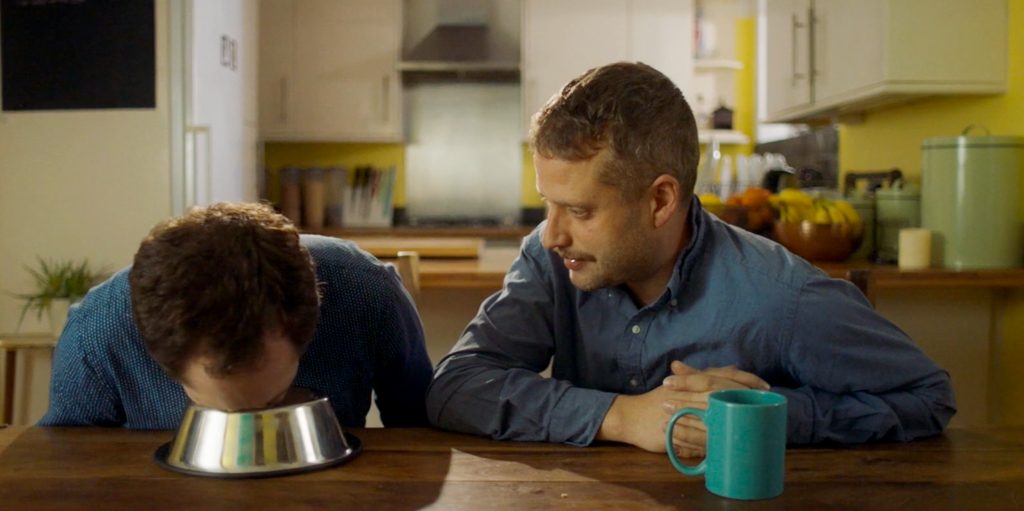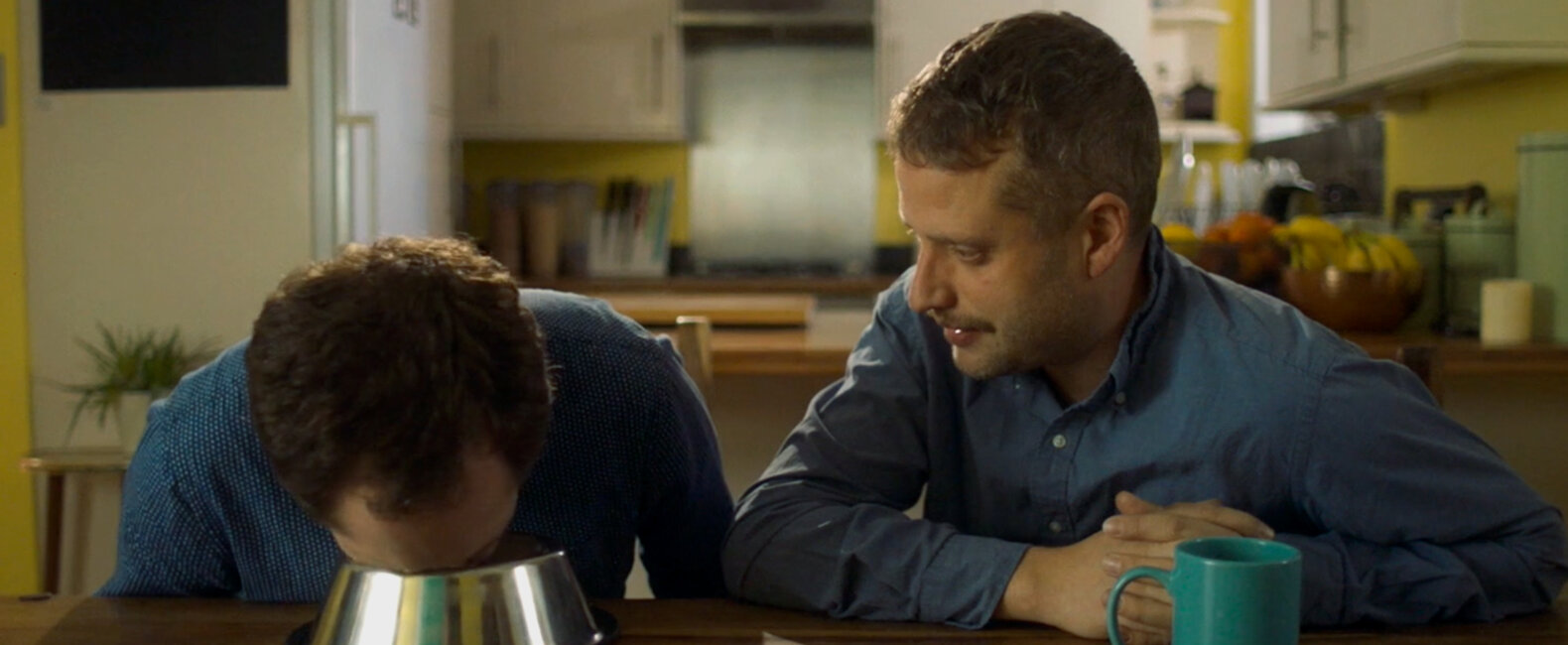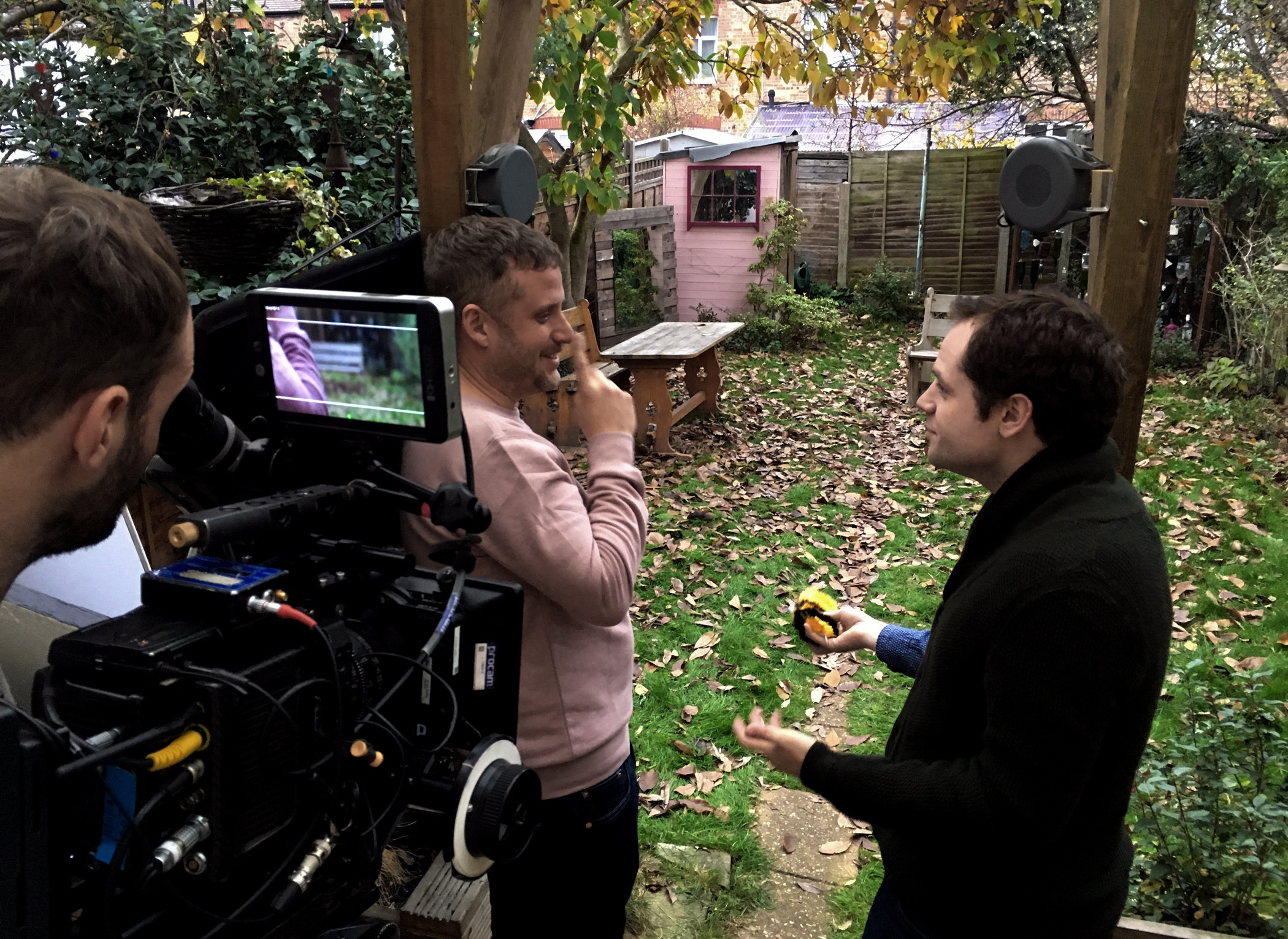Tom Levinge’s comedic short, Mister Biscuits, is silly. It suspends reality by putting humans in the roles of beloved pets. There’s the occasional poop gag. And it’s unapologetically a “dog movie,” whereby the power of one’s pet’s affections is strong enough to help the protagonist recover, repair, and move on with their life — despite undergoing some pretty significant hardships. And yet, that’s exactly what makes this piece such a fantastic filmmaking achievement. It’s recognizable but inventive. It’s impossible, but it’s honest. It’s silly but just self-aware enough to be taken seriously. As Tom put it:
“Comedy is actually a great way to point out how ludicrous a lot of our everyday behavior can be. … It’s a really good way to talk about the human condition in a way that people can get on board with.”
Levinge and his entire creative team, including the cast, embraced the spirit of improvisation to develop every bit and beat in this 8-minute piece, and the collaborative effort shines through in every second. They ended up with a finished product so far-fetched that you can’t help but succumb to its charms.
Here’s our conversation with Tom.
Musicbed: What’s your philosophy on comedy?
Tom Levinge: Comedy is actually a great way to point out how ludicrous a lot of our everyday behavior can be. I love comedy. I bloody love comedy. It’s a really good way to talk about the human condition in a way that people can get on board with.
Actually, can I ask you a question? How would you imagine a person or a team might come up with something like this – you know, a short film that’s kind of weird and whimsical?
Well, we were going to ask you the exact same thing. How’d you do it?
It’s an interesting conundrum. If I saw something like that, I would probably think to myself, This filmmaker must have always been making films like this. But actually, developing Mister Biscuits took ages. It took a year of my co-writer Jez Scharf and me throwing around ideas together. Originally, all I had on the page was this notion of a guy who kept a man as a pet.
Then I had a meeting with David Elms, who plays the title character, and he came up with some great ideas that really made the entire idea more conceivable. It still amazes me that before David and the rest of the cast got involved, there was a version of this film where the main character gets kidnapped by some Russians. And then just as they’re about to kill him, Mister Biscuits saves the day.
Wow.
Yeah. It’s so different from what we ended up with. [Laughs] Obviously. But, with a concept like this, how the hell do you end it? It took a really long period of getting it wrong, over and over and over again, and talking about it until it became the simple little film that it is.
The development process can be so strange. That’s why I asked you what you thought, because it definitely didn’t come naturally. It took lots of workshopping it and rehearsing with the actors and writing scripts that were just shit until we came up with something that felt right and felt good. And that’s what we ended up shooting.
Maybe we should start at the beginning. Where did this idea come from?
Oh, good question. I’ve got absolutely no idea. [Laughs] I kind of thought to myself, What if people kept humans as pets? Like a man-dog, for example.
Was this inspired by your own dog?
No, I’ve never had a dog of my own before, but I moved into a house with a friend who had a dog. I’ve never really thought it was that cool to keep animals as pets – like what do they want? Are they alright with it? It’s impossible to know. And maybe our dogs have their own weird ideas about how humans actually belong to them. I haven’t really analyzed it, but I’m sure that’s where the idea came from.
Why was this an important story to tell as a filmmaker?
If I’m being brutally honest, it was just an idea I had that I thought would be fun to shoot with some of my super talented friends. I think people make different films for different reasons at different times – maybe you have this message you’re really passionate about sharing, or you want to work with a specific actor or try out a new bit of kit. There are all kinds of reasons why you chose to tell a specific story. That’s actually one of the hardest parts: picking the story. Also catering. The catering is a minefield.
Your midpoint, where John tells Mister Biscuits he’s a good boy, happens exactly halfway through the film, almost to the second.
Yes, I’m glad you noticed that. We didn’t plan for that to happen, but it worked out pretty perfectly.
Do you adhere to any structural principles like that, or do you feel filmmaking should be more flexible?
Honestly, I’m very interested in storytelling structure, but implementing all of that stuff comes later. It changes, but normally I start by trying to think up as many jokes as possible, and then I find a way to work them in. That’s just me, though. I’ll take the kernel of an idea, something similar to a man who keeps a human as a pet, and I talk to Jez, my co-writer, for ages about what could happen and what has happened in our own lives that we can use. Then I tell myself, Okay, now let’s get down to the bare bones and the structure of what this story is. That’s just one way of doing it, and I think it makes sense if you’re aiming to make something funny.

So comedy is the core, and everything else is built up to support that?
Exactly. With Mister Biscuits, I think a lot of the structuring came naturally. We didn’t stop to look at the script and ask ourselves, Oh god, have we nailed all the beats? Do we have the midpoint, right? But because it was a collaborative process, I don’t think it could’ve come together any other way.
Directing animals is hard enough, but directing humans to behave as animals?
Well, David and I talked about his role for a long time. The conclusion we came to was that he absolutely loved the person he was in the scene with more than anything in the world, and he’d have incredible concentration. Dogs naturally concentrate on what they’re doing really intently. Then, in a split second, they’ll be like, “I’m going to run away and do this instead,” and become completely fixated on whatever that new thing is. We decided David had to be really present at all times. David came up with so much of that character; I can’t really take any credit for it. The man is so talented and it was a real joy creating Mister Biscuits with him.
It actually made developing the narrative, conflicts included, simpler. You can’t change a dog unless you’re some sort of master trainer, which John — Mister Biscuits’ sitter — clearly isn’t. More than anything, he just wants to be alone in the house. The poor guy just wants to be left alone. He doesn’t want to deal with a clearly annoying but well-intentioned creature. Which, by the way, is exactly how I felt when I had to look after my friend’s dog one weekend after I’d moved in. I didn’t want to be hassled in the slightest. And then tragedy struck, and the dog had an epileptic fit. He was vomiting, and I had to hug him until he calmed down. That’s when the purpose of the person-pet relationship became clear to me.
John just wanted to be alone; I just wanted to be alone. Mister Biscuits just wanted love; my friend’s dog just needed that affection and dedication in that moment. Underneath it all, Mister Biscuits is giving John exactly what he doesn’t realize he needs in that moment. Instead of bringing strife into his life the way his ex-girlfriend did, Mister Biscuits helps John realize, Maybe I’m all right, and maybe everything’s going to be okay. That’s how we dealt with the conflict between the two of them.
It’s sort of like an irresistible force meets an immovable object.
Yes! Dogs can be just as frustrating as they are loveable, and most of the time we can’t change that about them. It teaches you a lot about yourself.
What do you think makes for a good character? A human one, specifically.
Well, you have to have a strong point of view. Strong characters always have a very specific way of seeing the world. But that outlook has to be justified in some way. A justified point of view drives the story forward.
In the beginning, we looked at John as though he were some sort of grown-up child, but by the end he’s more willing to maybe accept someone else’s issues instead of harping on his own. He has a strong sense of identity from the second he opens his mouth, and I think that makes his journey more compelling to watch.
You credited the cast for their help in developing the script. How did the collaboration help shape the story?
Without this brilliant cast it’d probably still be some crazy story about Russian gangsters or something. I remember when we were chatting about the idea, William said that it was like a writing puzzle, working out the logic of it, so we all did a lot of head scratching. We’d say things like, “Oh my god, is this going to make sense? How are we going to show that John can’t understand Mister Biscuits?” It’s like, how are we going to portray that? William, who played John, actually did a fantastic job of making that work.
The cast and crew all lived in that house together while we were shooting the film. There was a day of rehearsal on location, then re-writing, then shooting. The atmosphere was lovely and familial and I think if it’s any good at all, it’s because we were all together, concentrating on making this fun, little thing.
The ending almost has a bit of rom-com vibe to it. What inspired that?
Yes, and it was incredibly hard nailing down that ending. We didn’t want it to be this overtly lovely ending, and we didn’t want it to be a horrible one either.
Hence why you didn’t keep the idea involving the Russians.
Right, anything like that or anything along the lines of Mister Biscuits getting run over just didn’t feel right. I suppose the ending we went with was sort of the middle ground between all the different ways we were considering ending it. People complain that the ending was kind of sad in comparison to the rest of the film.
I wish I could tell you some really intellectual, emotional story about how we landed on that ending. But really, I think we just thought it was the way to go about it. So many of the choices we made were based on doing what felt right. The whole film was like that. Once we came to the conclusion that it should be a nice story about a guy becoming friends with a man-dog, we had no choice but to do what we knew we had to do, and never wonder if we’d crossed the “too silly” line.
What makes for a good ending, in your opinion?
I think how a film ends should depend completely on what your characters want, and what they’re doing to try and get it. You can be taken to amazing places by unexpected endings and you can also feel very satisfied by an ambiguous ending that keeps you guessing…and then you can just knock it out the park and tie everything up beautifully like in Paddington 2. I reckon a good ending just depends on your story. I mean if Paddington 2 finished on an enigmatic note I don’t think it would be such a crowd pleaser. If I could give one piece of advice to anyone reading this interview it would be quite simple: you absolutely must go and watch Paddington 2.



















































































